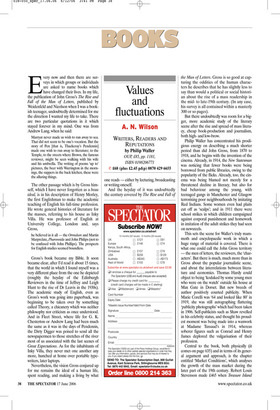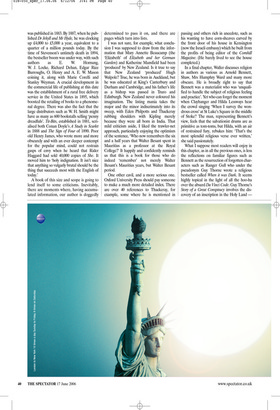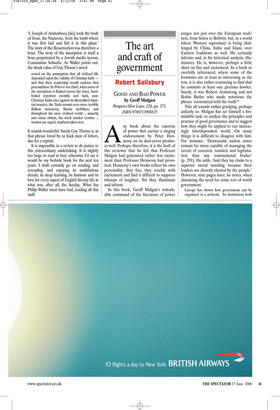Values and fluctuations
A. N. Wilson
WRITERS, READERS AND REPUTATIONS by Philip Waller OUP, £85, pp. 1181, ISBN 0198206771 V £68 (plus £2.45 p&p) 0870 429 6655 Every now and then there are surveys in which groups or individuals are asked to name books which have changed their lives. In my life, the publication of John Gross’s The Rise and Fall of the Man of Letters, published by Weidenfeld and Nicolson when I was a bookish teenager, undoubtedly determined for me the direction I wanted my life to take. There are two particular quotations in it which stayed forever in my mind. One was from Andrew Lang, when he said:
Marryat never made us wish to run away to sea. That did not seem to be one’s vocation. But the story of Pen [that is, Thackeray’s Pendennis] made one wish to run away to literature; to the Temple, to the streets where Brown, the famous reviewer, might be seen walking with his wife and his umbrella. The writing of poems ‘up to’ pictures, the beer with Warrington in the mornings, the suppers in the back kitchen, these were the alluring things.
The other passage which is by Gross himself, which I have never forgotten as a beau ideal, is in his description of Henry Morley, the first Englishman to make the academic teaching of English his full-time profession. He wrote general histories of literature for the masses, referring to his house as Inky Villa. He was professor of English at University College, London and, says Gross, he believed in it all — the Ormulum and Martin Marprelate, Pharonnida and John Philips (not to be confused with John Phillips). The prospects for English studies seemed boundless.
Gross’s book became my Bible. It soon became clear, after I’d read it about 15 times, that the world in which I found myself was a very different place from the one he depicted (roughly the heyday of the Edinburgh Reviewers in the time of Jeffrey and Leigh Hunt to the rise of Dr Leavis in the 1930s). The academic study of English, even as Gross’s work was going into paperback, was beginning to be taken over by something called Theory, a chicanery which was neither philosophy nor criticism as once understood. And in Fleet Street, where life for G. K. Chesterton or Andrew Lang had been much the same as it was in the days of Pendennis, the Dirty Digger was poised to send all the newspapermen to those stretches of the river most of us associated with the last scenes of Great Expectations. As for the inhabitants of Inky Villa, they never met one another any more, hunched at home over portable typewriters, later laptops.
Nevertheless, the vision Gross conjured up for me remains the ideal of a human life, spent reading, and making a living by what one reads — either by lecturing, broadcasting or writing oneself.
And the heyday of it was undoubtedly the century covered by The Rise and Fall of the Man of Letters. Gross is so good at capturing the oddities of the human characters he describes that he has slightly less to say than would a political or social historian about the rise of a mass readership in the midto late-19th century. (In any case, his survey is all contained within a masterly 300 or so pages).
But there undoubtedly was room for a bigger, more academic study of the literary scene after the rise and spread of mass literacy, cheap book-production and journalism, both highand low-brow.
Philip Waller has concentrated his prodigious energy on describing a much shorter period than did John Gross, from 1870 to 1918, and he begins with the invention of the cinema. Already, in 1914, the New Statesman was noticing that fewer books were being borrowed from public libraries, owing to the popularity of the flicks. Already, too, the cinema was being blamed not merely for a threatened decline in literacy, but also for bad behaviour among the young, with teenaged gangs in Manchester and Glasgow terrorising poor neighbourhoods by imitating Red Indians. Some women even had plaits cut off as ‘scalps’; and in 1911 there were school strikes in which children campaigned against corporal punishment and homework in imitation of the adult strikes they had seen on newsreels.
This sets the scene for Waller’s truly mammoth and encyclopaedic work in which a huge range of material is covered. There is what one could call the John Gross territory — the men of letters, the reviewers, the ‘characters’. But there is much, much more than in Gross about the popular journalistic scene, and about the interrelations between literature and economics. Thomas Hardy could object to being ‘kodaked by some young men who were on the watch’ outside his house at Max Gate in Dorset. But new breeds of author positively courted publicity. When Marie Corelli was ‘64 and looked like 80’ in 1919, she was still autographing flattering ‘publicity photographs’ which had been taken in 1906. Self-publicists such as Shaw revelled in his celebrity status, and thought his proudest moment was being made into a waxwork at Madame Tussaud’s in 1914, whereas soberer figures such as Conrad and Henry James deplored the vulgarisation of their profession.
Central to the book, both physically (it comes on page 635) and in terms of its general argument and approach, is the chapter entitled ‘Market Conditions’, which analyses the growth of the mass market during the later part of the 19th century. Robert Louis Stevenson made £465 when Treasure Island was published in 1883. By 1887, when he published Dr Jekyll and Mr Hyde, he was clocking up £4,000 to £5,000 a year, equivalent to a quarter of a million pounds today. By the time of Stevenson’s untimely death in 1894, the bestseller boom was under way, with such authors as E. W. Hornung, W. J. Locke, Richard Dehan, Edgar Rice Burroughs, O. Henry and A. E. W. Mason coining it, along with Marie Corelli and Stanley Weyman. A crucial development in the commercial life of publishing at this date was the establishment of a rural free delivery service in the United States in 1895, which boosted the retailing of books to a phenomenal degree. There was also the fact that the large distributors such as W. H. Smith might have as many as 600 bookstalls selling ‘penny dreadfuls’. Tit-Bits, established in 1881, serialised both Conan Doyle’s A Study in Scarlet in 1888 and The Sign of Four of 1890. Poor old Henry James, who wrote more and more obscurely and with an ever deeper contempt for the popular mind, could not restrain gasps of envy when he heard that Rider Haggard had sold 40,000 copies of She. It moved him to ‘holy indignation. It isn’t nice that anything so vulgarly brutal should be the thing that succeeds most with the English of today.’ A book of this size and scope is going to lend itself to some criticisms. Inevitably, there are moments where, having accumulated information, our author is doggedly determined to pass it on, and there are pages which turn into lists.
I was not sure, for example, what conclusion I was supposed to draw from the information that Mary Annette Beaucamp (the ‘Elizabeth’ of Elizabeth and her German Garden) and Katherine Mansfield had been ‘produced’ by New Zealand. Is it true to say that New Zealand ‘produced’ Hugh Walpole? True, he was born in Auckland, but he was educated at King’s Canterbury and Durham and Cambridge, and his father’s life as a bishop was passed in Truro and Edinburgh. New Zealand never coloured his imagination. The listing mania takes the major and the minor indiscrimately into its sweep, with Eden Philpotts and Thackeray rubbing shoulders with Kipling merely because they were all born in India. That mild criticism aside, I liked the trawler-net approach, particularly enjoying the optimism of the sentence, ‘Who now remembers the six and a half years that Walter Besant spent in Mauritius as a professor at the Royal College?’ It happily and confidently reminds us that this is a book for those who do indeed ‘remember’ not merely Walter Besant’s Mauritius years, but Walter Besant period.
One other cavil, and a more serious one. Oxford University Press should pay someone to make a much more detailed index. There are over 40 references to Thackeray, for example, some where he is mentioned in passing and others rich in anecdote, such as his wanting to have corn-sheaves carved by the front door of his house in Kensington (now the Israeli embassy) which he built from the profits of being editor of the Cornhill Magazine. (He barely lived to see the house completed.) In a final chapter, Waller discusses religion in authors as various as Arnold Bennett, Shaw, Mrs Humphry Ward and many more obscure. He is broadly right to say that Bennett was a materialist who was ‘unqualified to handle the subject of religious feeling and practice’. Yet who can forget the moment when Clayhanger and Hilda Lessways hear the crowd singing ‘When I survey the wondrous cross’ at St Luke’s Square in the middle of Stoke? The man, representing Bennett’s view, feels that the salvationist drums are as primitive as tom-toms, but Hilda, with an air of restrained fury, rebukes him: ‘That’s the most splendid religious verse ever written,’ she said passionately.
What I suppose most readers will enjoy in this chapter, as in all the previous ones, is less the reflections on familiar figures such as Bennett as the resurrection of forgotten characters such as Ranger Gull who under the pseudonym Guy Thorne wrote a religious bestseller called When it was Dark. It seems highly topical in the light of all the hoo-ha over the absurd Da Vinci Code. Guy Thorne’s Story of a Great Conspiracy involves the discovery of an inscription in the Holy Land — ‘I, Joseph of Arimathoea [sic], took the body of Jesus, the Nazarene, from the tomb where it was first laid and hid it in this place.’ The story of the Resurrection was therefore a hoax. The story of the inscription is itself a hoax perpetrated by a Jewish media tycoon, Constantine Schuabe. As Waller points out, the shock value of Guy Thorne’s novel rested on the assumption that all civilised life depended upon the validity of Christian faith and that their readership would endorse that precondition. In When it was Dark, when news of the inscription is flashed across the wires, hardboiled reporters tremble and faint, nonChristian India rises against its discredited imperial masters, the Turks mount even more terrible Balkan massacres, Russia mobilises, and throughout the once civilised world ... anarchy and crime obtain, the stock market crashes ... women are raped, mayhem takes over.
It sounds wonderful. Surely Guy Thorne is, in that phrase loved by us hack men of letters, due for a reprint.
It is impossible in a review to do justice to this extraordinary undertaking. It is slightly too large to read in bed, otherwise I’d say it would be my bedside book for the next ten years. I shall certainly go on reading, and rereading, and enjoying its multifarious details, its deep learning, its humour and its love for every aspect of English literary life in what was, after all, the heyday. What fun Philip Waller must have had, reading all this stuff.




















































































 Previous page
Previous page